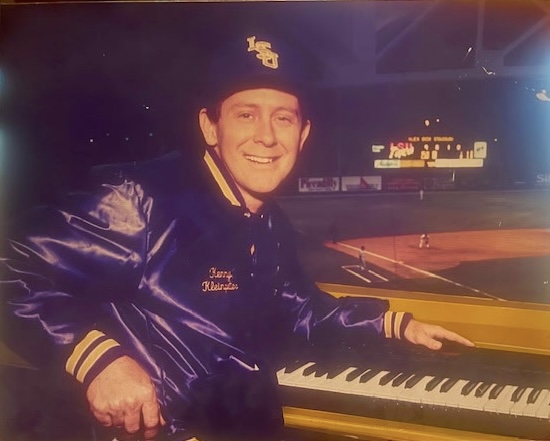Firmly posted in Alex Box Stadium’s right-field bleachers, a gigantic snarling tiger draws the eye toward LSU baseball’s long list of accomplishments on a billboard aptly named “the Intimidator.”
Listed are six College World Series championships, all of which came in a 19-year span.
It’s hard to fathom there once was a time before the domination that inspired “the Intimidator.” Before the 1984 season, LSU baseball was just simply there, existing, and not doing much else.
Former LSU baseball coach and athletic director Skip Bertman transformed the baseball program from a campus afterthought into one of the premier institutions in the nation.
Before Bertman’s arrival in 1984 from the University of Miami, LSU more closely resembled an intramural team than the Southeastern Conference powerhouse it has become today.
In its entire history that dates back to the first team in 1893, LSU had just one regional appearance in college baseball’s postseason, a 1975 berth that culminated in an 8-1 loss to Bertman’s alma mater, Miami.
“They were mired in mediocrity,” Bertman said. “They played almost .500 baseball and they were happy with that. They didn’t think they could compete, they had limited facilities, staff and budgets.”
The main hurdle the team had trouble clearing was the attitude toward the sport from the institutional level, where there was almost no commitment to the baseball team, financial or otherwise.
“When I started [at LSU], there were two sports,” Bertman said. “Football and spring football.”
From 1966 to 1978, LSU coach Jim Smith couldn’t even direct his full attention to his squad.
“Our baseball coach was Jimmy Smith, a wonderful man, but his main job was the equipment manager for football,” said LSU coach Paul Mainieri, who spent one season as an LSU player in 1976. “That’s how he earned his salary. … Isn’t that bizarre?”
Mainieri said Smith could only show up for one day of fall practices per week – Sunday, football’s off day.
LSU couldn’t hire a full-time coach and could barely supply the team with baseballs.
Daryl Wax, who pitched at LSU from 1976 to 1980, remembers chasing down foul balls that went into the stands and returning them to the field so the team would have enough to get through a game.
Wax said the efforts made him a better track athlete than a baseball player.
“You weren’t caught as a player handing a little kid a baseball back in those days,” Wax said. “If you did get caught, you paid for it. … Can you imagine Mainieri sitting up there and somebody hit a foul ball saying, ‘Can you get that ball? Can somebody bring that ball back in?'”
But Bertman’s guiding hand quickly turned everything upside-down.
How quickly? In just his second season, Bertman had his first NCAA regional appearance. The next year, in 1986, LSU earned its first trip to Omaha, Neb., w the College World Series.
Bertman said he had a system in place, he just needed to put the right athletes into the lineup. His team’s successes were drawing an ever-increasing number of fans to the ball park, but Bertman, the showman, put the casual fan in the seats.
Like a real-life Jackie Moon from the movie “Semi-Pro,” Bertman set up zany entertainment between innings to attract a wide audience.
Included in Bertman’s shows were Captain Dynamite, who would “blow himself up in a coffin at second base,” the money scramble where a fan would get 30 seconds to grab up to $250 in cash, and diamond night, where 1,500 diamonds were given to the crowd – 1,499 were fake, one was real.
When Bertman first got to LSU, he said the team would average roughly 270 fans per night. Now, the team routinely sells out the 10,326-seat Alex Box Stadium and has led the nation in attendance for 16 consecutive seasons.
The fans have packed the Box since the start of the Bertman legacy, watching their Tigers win five titles in a decade starting in the early ’90s. Mainieri called the timing of LSU’s rise “a perfect storm.”
“The football program had struggled in the ’90s and Skip had built this outstanding baseball program,” Mainieri said. “It really became a program that LSU fans and followers could take a lot of pride in.”
Bertman transformed the baseball culture not only at LSU, but throughout much of the Southeast.
Others saw his method for success and copied it. Fans started turning in at opposing stadiums. In-state teams built their programs furiously to stay competitive with college baseball’s newest powerhouse.
“Skip Bertman put the sport on the map and the conference has reaped the benefits of what he did here at LSU,” Wax said.
The current Tigers don’t need Captain Dynamite’s explosive act anymore – the seats are already packed with active eyes.
The Intimidator faces inward, toward the box seats and luxury suites in LSU’s multimillion dollar baseball stadium – a far cry from the days where players chased foul balls into the stands.
Emblazoned above a suite positioned behind the LSU dugout is the retired number 15, Bertman’s stamp on the house he built.
____
Contact Luke Johnson at ljohnson@lsureveille.com
Baseball: Bertman transformed baseball program into national power
April 3, 2012








